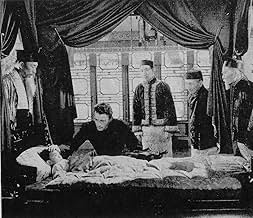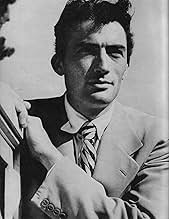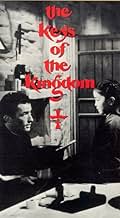CALIFICACIÓN DE IMDb
7.2/10
3.3 k
TU CALIFICACIÓN
Un joven sacerdote es enviado a China para fundar una parroquia católica.Un joven sacerdote es enviado a China para fundar una parroquia católica.Un joven sacerdote es enviado a China para fundar una parroquia católica.
- Dirección
- Guionistas
- Elenco
- Nominado a 4 premios Óscar
- 2 premios ganados y 5 nominaciones en total
Rose Stradner
- Rev. Mother Maria-Veronica
- (as Rosa Stradner)
Cedric Hardwicke
- Monsignor at Tweedside
- (as Sir Cedric Hardwicke)
- Dirección
- Guionistas
- Todo el elenco y el equipo
- Producción, taquilla y más en IMDbPro
Opiniones destacadas
So often in older Hollywood films, religious films are cloying or loaded with clichés. While they try to be inspiring, they often leave me feeling a bit embarrassed because they are just so badly written--filled with platitudes and unrealistically "holy" performances. Because of this, I didn't rush to see this film--even though it starred one of my favorite actors, Gregory Peck. I was so pleasantly surprised to see that instead of the near-perfect and bigger than life character, Peck played a very down to earth and decent sort of priest--who was still quite human. Because of this, the film seemed real and very watchable.
The film begins with an old Gregory Peck living as a very old priest in Scotland. He is being chastised for his unorthodox ways, though after a minor chewing out, his superior, Cedric Hardwicke happens upon Peck's diary and begins to read about his career. At this point, the film becomes a flashback and we see a younger and more vigorous Peck in his native Scotland (though he never comes close to approximating the accent). From his college days to becoming a missionary in China we see his growth and mistakes and his humility throughout it all.
This gentle film manages to pull the viewer in due to its excellent acting, writing and direction. One thing I really liked is that the Chinese roles were actually all played by Asian-Americans--not the more traditional White guys ridiculously made up to look Chinese. There's very little not to like here--give it a look and don't worry--it's very enjoyable and not the least bit preachy.
FYI--Although Cedric Hardwicke is reading Gregory Peck's diary in order to know what was occurring, there were a few instances when information took place on the screen in the flashback that Peck could not have known and could not have written in his diary. In other words, how could Hardwicke be reading about things that others did if they never told Peck? Just a minor continuity problem and it doesn't seriously effect the film.
The film begins with an old Gregory Peck living as a very old priest in Scotland. He is being chastised for his unorthodox ways, though after a minor chewing out, his superior, Cedric Hardwicke happens upon Peck's diary and begins to read about his career. At this point, the film becomes a flashback and we see a younger and more vigorous Peck in his native Scotland (though he never comes close to approximating the accent). From his college days to becoming a missionary in China we see his growth and mistakes and his humility throughout it all.
This gentle film manages to pull the viewer in due to its excellent acting, writing and direction. One thing I really liked is that the Chinese roles were actually all played by Asian-Americans--not the more traditional White guys ridiculously made up to look Chinese. There's very little not to like here--give it a look and don't worry--it's very enjoyable and not the least bit preachy.
FYI--Although Cedric Hardwicke is reading Gregory Peck's diary in order to know what was occurring, there were a few instances when information took place on the screen in the flashback that Peck could not have known and could not have written in his diary. In other words, how could Hardwicke be reading about things that others did if they never told Peck? Just a minor continuity problem and it doesn't seriously effect the film.
I first saw this movie some 35 years ago. It is a brilliant move that goes to the heart of showing the difference between a spiritual relationship and religion. It covers clearly so many ethical issues of life.
While the name of the movie may not in itself draw a person to watching it, it is nevertheless well worth watching. The entire cast of this movie was so well chosen that once seen in these roles it is hard to imagine them as playing any other part. Gregory Peck in the role of Father Francis Chisholm, Thomas Mitchell as Dr. Willie Tullock and Vincent Price as he Rev. Angus Mealey are a few examples of the excellent casting.
A movie that promotes great introspection and a lot of tears
While the name of the movie may not in itself draw a person to watching it, it is nevertheless well worth watching. The entire cast of this movie was so well chosen that once seen in these roles it is hard to imagine them as playing any other part. Gregory Peck in the role of Father Francis Chisholm, Thomas Mitchell as Dr. Willie Tullock and Vincent Price as he Rev. Angus Mealey are a few examples of the excellent casting.
A movie that promotes great introspection and a lot of tears
This outstanding film was made in 1944. It's a real treasure in that it gave us a superb performance by Gregory Peck, a plain priest, seeking to do the work of the Lord, after he has experienced great personal tragedies in his young life. This film accounted for Peck's first Oscar nomination and it truly is a triumphant one.
Doing the Lord's work by going to China would be Peck's destiny-thanks to the wise bishop played by Edmund Gwenn. The film well depicts the church hierarchy and how many important officials have unfortunately forgotten their purpose in life.
For a change, Vincent Price, high in the church hierarchy, represents the above comment. However, it was good seeing him in a part where he isn't representing evil.
In a supporting role, Joseph L. Mankiewicz's wife in real life is phenomenal. A crusty nun with self-imposed values, she is just wonderful as she comes to view the worthiness of the Peck character.
This film truly serves as an inspiration to all those seeking spiritual salvation as well as a life of true fulfillment and commitment.
Thomas Mitchell shines as Peck's atheist doctor friend. Peck showed his true value as Mitchell was dying, never trying to impose his religious values on him.
Doing the Lord's work by going to China would be Peck's destiny-thanks to the wise bishop played by Edmund Gwenn. The film well depicts the church hierarchy and how many important officials have unfortunately forgotten their purpose in life.
For a change, Vincent Price, high in the church hierarchy, represents the above comment. However, it was good seeing him in a part where he isn't representing evil.
In a supporting role, Joseph L. Mankiewicz's wife in real life is phenomenal. A crusty nun with self-imposed values, she is just wonderful as she comes to view the worthiness of the Peck character.
This film truly serves as an inspiration to all those seeking spiritual salvation as well as a life of true fulfillment and commitment.
Thomas Mitchell shines as Peck's atheist doctor friend. Peck showed his true value as Mitchell was dying, never trying to impose his religious values on him.
What a wonderful story of a man, despite much adversity, contributes himself to the Chinese community he loves so much. It is amazing how Peck makes it so effortless (even in his only second film)in portraying a young man to one in his twilight years. He personifies morality and quiet integrity in this film, reminiscent to the role that he would play nearly twenty years later in TO KILL A MOCKINGBIRD.
The supporting cast which performs more than ably is led by Cedric Hardwicke playing a monsignor who was initially critical of the Peck character but emerges having respect for him after reading his memoirs (which form the narration for the film. Others include Thomas Mitchell as the irreverent self-proclaimed atheist who does much to provide the witty humour for the film, Edmund Gwenn as Peck's plucky mentor at the seminary who uses the term "ecclesiastical mechanic" to describe priests who are inflexible and bureaucratic, and Rose Stradner as the Mother Superior who falls in love with Peck (you only get a hint of this).
One of the highlights is the film's efforts in portraying the Chinese in a sensitive manner in terms of the customs shown and dialects used. This is very unlike films of its era which tended to portray Asians in a more stereotypical fashion.
The supporting cast which performs more than ably is led by Cedric Hardwicke playing a monsignor who was initially critical of the Peck character but emerges having respect for him after reading his memoirs (which form the narration for the film. Others include Thomas Mitchell as the irreverent self-proclaimed atheist who does much to provide the witty humour for the film, Edmund Gwenn as Peck's plucky mentor at the seminary who uses the term "ecclesiastical mechanic" to describe priests who are inflexible and bureaucratic, and Rose Stradner as the Mother Superior who falls in love with Peck (you only get a hint of this).
One of the highlights is the film's efforts in portraying the Chinese in a sensitive manner in terms of the customs shown and dialects used. This is very unlike films of its era which tended to portray Asians in a more stereotypical fashion.
In his second film Gregory Peck got the first of his Best Actor nominations for playing the pious and devote Father Francis Chisholm in The Keys of the Kingdom.
When we meet Peck he's an elderly priest who's got a visitor in Monsignor Cedric Hardwicke who has come to the Scottish town where he's from and now is a pastor. Hardwicke's there to investigate complaints about him. Peck puts him up for the night in his own room where he keeps a journal that he has faithfully recorded his life. On an impulse, Hardwicke decides it might be good bedtime reading.
When we first meet Peck, elderly and infirm that he is, he looks like he could be the model for Alec Guinness's muddled old reverend in Kind Hearts and Coronets. But as Hardwicke reads Peck's words and we go back over his life, it's been a pious and rewarding one as a missionary in China.
The film is a flashback narrative of his life as a missionary. And the film is held together by the sincere and deeply felt performance of Gregory Peck as Father Chisholm. Peck has some terribly unorthodox ideas as a priest. For one thing he's not preaching that his own denomination has the corner on a good afterlife. Late in the film, some Protestant missionaries come, James Gleason and Anne Revere, and he becomes great friends with both. He's even friends with a self styled atheist in Thomas Mitchell who is an atheist, a medical doctor and a good man indeed. Mitchell's deathbed scene with Peck is quite touching and avoids a lot of the clichés associated with such scenes.
Another thing is Peck and the sisters led by Rose Stradner who later come to help live as simply and modestly as the Chinese around them. They gain some converts, but even more importantly they gain the respect of those around them. This is contrasted when Peck's childhood friend Vincent Price who has become a bishop and takes the phrase Prince of the Church quite literally.
The casting in the film is first rate and 20th Century Fox did a good job in recreating the feel and atmosphere of China which at that point was engaged in expelling the Japanese from their soil. The Keys of the Kingdom got several Oscar nominations including Peck's, but came up short on the statues.
I enjoyed the film a whole lot and I don't think one has to be a firm believer in any Christian denomination to enjoy it. Peck's Father Francis Chisholm may have led an obscure life, but his faith sustains him through all and he leads by sheer example. It's something that a lot of religious leaders fall short of, but not in this case.
Peck's life will surely gain him possession of The Keys of the Kingdom and we could all use a lot more Father Chisholms in this world.
When we meet Peck he's an elderly priest who's got a visitor in Monsignor Cedric Hardwicke who has come to the Scottish town where he's from and now is a pastor. Hardwicke's there to investigate complaints about him. Peck puts him up for the night in his own room where he keeps a journal that he has faithfully recorded his life. On an impulse, Hardwicke decides it might be good bedtime reading.
When we first meet Peck, elderly and infirm that he is, he looks like he could be the model for Alec Guinness's muddled old reverend in Kind Hearts and Coronets. But as Hardwicke reads Peck's words and we go back over his life, it's been a pious and rewarding one as a missionary in China.
The film is a flashback narrative of his life as a missionary. And the film is held together by the sincere and deeply felt performance of Gregory Peck as Father Chisholm. Peck has some terribly unorthodox ideas as a priest. For one thing he's not preaching that his own denomination has the corner on a good afterlife. Late in the film, some Protestant missionaries come, James Gleason and Anne Revere, and he becomes great friends with both. He's even friends with a self styled atheist in Thomas Mitchell who is an atheist, a medical doctor and a good man indeed. Mitchell's deathbed scene with Peck is quite touching and avoids a lot of the clichés associated with such scenes.
Another thing is Peck and the sisters led by Rose Stradner who later come to help live as simply and modestly as the Chinese around them. They gain some converts, but even more importantly they gain the respect of those around them. This is contrasted when Peck's childhood friend Vincent Price who has become a bishop and takes the phrase Prince of the Church quite literally.
The casting in the film is first rate and 20th Century Fox did a good job in recreating the feel and atmosphere of China which at that point was engaged in expelling the Japanese from their soil. The Keys of the Kingdom got several Oscar nominations including Peck's, but came up short on the statues.
I enjoyed the film a whole lot and I don't think one has to be a firm believer in any Christian denomination to enjoy it. Peck's Father Francis Chisholm may have led an obscure life, but his faith sustains him through all and he leads by sheer example. It's something that a lot of religious leaders fall short of, but not in this case.
Peck's life will surely gain him possession of The Keys of the Kingdom and we could all use a lot more Father Chisholms in this world.
¿Sabías que…?
- TriviaTellingly, the film was made during the long interim of the Chinese Civil War when hostilities between Chinese nationalists and the Communists were suspended in order to fight off the Japanese invasion during World War II.
- ErroresIn the scene where Father Francis Chisholm (Gregory Peck) is leaving his mission in China after being ordered into retirement, the children are heard singing his favorite hymn as he steps from the car, but when the camera shows the children singing, it is obvious that they are mouthing something entirely different from what is being heard.
- Citas
[last lines]
Father Francis Chisholm: Well, man, don't stand there with half the morning gone - get the rods!
[Andrew fetches the fishing poles]
Father Francis Chisholm: Come along, boy. Wasn't it just fine of God to make all the rivers and fill them all with little fishes and then send you and me here to catch them, Andrew? Hm?
- ConexionesFeatured in Gregory Peck: His Own Man (1988)
Selecciones populares
Inicia sesión para calificar y agrega a la lista de videos para obtener recomendaciones personalizadas
- How long is The Keys of the Kingdom?Con tecnología de Alexa
Detalles
Taquilla
- Presupuesto
- USD 3,000,000 (estimado)
- Tiempo de ejecución2 horas 17 minutos
- Color
- Relación de aspecto
- 1.37 : 1
Contribuir a esta página
Sugiere una edición o agrega el contenido que falta

Principales brechas de datos
By what name was Las llaves del reino (1944) officially released in India in English?
Responda





































